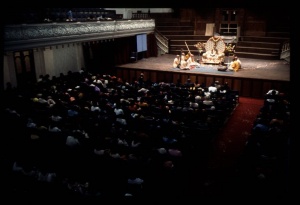SB 10.1.10: Difference between revisions
m (1 revision(s)) |
(Vanibot #0018 edit: make synonym terms in Sanskrit italic in SB - Vanisource) |
||
| Line 1: | Line 1: | ||
{{info | {{info | ||
|speaker=King | |speaker=King Parīkṣit | ||
|listener= | |listener=Śukadeva Gosvāmī | ||
}} | }} | ||
[[Category:Srimad-Bhagavatam - Canto 10 Chapter 01]] | |||
[[Category:Bhagavatam Verses Spoken by Pariksit Maharaja - Vanisource|100110]] | |||
<div style="float:left">'''[[Srimad-Bhagavatam]] - [[SB 10|Tenth Canto]] - [[SB 10.1: The Advent of Lord Krsna: Introduction|Chapter 1: The Advent of Lord Kṛṣṇa: Introduction]]'''</div> | |||
<div style="float:right">[[File:Go-previous.png|link=SB 10.1.9]] '''[[SB 10.1.9]] - [[SB 10.1.11]]''' [[File:Go-next.png|link=SB 10.1.11]]</div> | |||
{{RandomImage}} | |||
==== TEXT 10 ==== | ==== TEXT 10 ==== | ||
<div | <div class="verse"> | ||
vraje vasan kim akaron | :vraje vasan kim akaron | ||
madhupuryāṁ ca keśavaḥ | :madhupuryāṁ ca keśavaḥ | ||
bhrātaraṁ cāvadhīt kaṁsaṁ | :bhrātaraṁ cāvadhīt kaṁsaṁ | ||
mātur addhātad-arhaṇam | :mātur addhātad-arhaṇam | ||
</div> | </div> | ||
| Line 17: | Line 22: | ||
==== SYNONYMS ==== | ==== SYNONYMS ==== | ||
<div | <div class="synonyms"> | ||
''vraje''—at Vṛndāvana; ''vasan''—while residing; ''kim akarot''—what did He do; ''madhupuryām''—in Mathurā; ''ca''—and; ''keśavaḥ''—Kṛṣṇa, the killer of Keśī; ''bhrātaram''—the brother; ''ca''—and; ''avadhīt''—killed; ''kaṁsam''—Kaṁsa; ''mātuḥ''—of His mother; ''addhā''—directly; ''a-tat-arhaṇam''—which was not at all sanctioned by the śāstras. | |||
</div> | </div> | ||
| Line 24: | Line 29: | ||
==== TRANSLATION ==== | ==== TRANSLATION ==== | ||
<div | <div class="translation"> | ||
Lord Kṛṣṇa lived both in Vṛndāvana and in Mathurā. What did He do there? Why did He kill Kaṁsa, His mother's brother? Such killing is not at all sanctioned in the śāstras. | Lord Kṛṣṇa lived both in Vṛndāvana and in Mathurā. What did He do there? Why did He kill Kaṁsa, His mother's brother? Such killing is not at all sanctioned in the śāstras. | ||
</div> | </div> | ||
| Line 31: | Line 36: | ||
==== PURPORT ==== | ==== PURPORT ==== | ||
<div | <div class="purport"> | ||
One's maternal uncle, the brother of one's mother, is on the level of one's father. When a maternal uncle has no son, his nephew legally inherits his property. Therefore, why did Kṛṣṇa directly kill Kaṁsa, the brother of His mother? Mahārāja Parīkṣit was very much inquisitive about the facts in this regard. | One's maternal uncle, the brother of one's mother, is on the level of one's father. When a maternal uncle has no son, his nephew legally inherits his property. Therefore, why did Kṛṣṇa directly kill Kaṁsa, the brother of His mother? Mahārāja Parīkṣit was very much inquisitive about the facts in this regard. | ||
</div> | </div> | ||
__NOTOC__ | |||
<div style="float:right; clear:both;">[[File:Go-previous.png|link=SB 10.1.9]] '''[[SB 10.1.9]] - [[SB 10.1.11]]''' [[File:Go-next.png|link=SB 10.1.11]]</div> | |||
__NOTOC__ | |||
__NOEDITSECTION__ | |||
Revision as of 10:52, 1 December 2017

A.C. Bhaktivedanta Swami Prabhupada
TEXT 10
- vraje vasan kim akaron
- madhupuryāṁ ca keśavaḥ
- bhrātaraṁ cāvadhīt kaṁsaṁ
- mātur addhātad-arhaṇam
SYNONYMS
vraje—at Vṛndāvana; vasan—while residing; kim akarot—what did He do; madhupuryām—in Mathurā; ca—and; keśavaḥ—Kṛṣṇa, the killer of Keśī; bhrātaram—the brother; ca—and; avadhīt—killed; kaṁsam—Kaṁsa; mātuḥ—of His mother; addhā—directly; a-tat-arhaṇam—which was not at all sanctioned by the śāstras.
TRANSLATION
Lord Kṛṣṇa lived both in Vṛndāvana and in Mathurā. What did He do there? Why did He kill Kaṁsa, His mother's brother? Such killing is not at all sanctioned in the śāstras.
PURPORT
One's maternal uncle, the brother of one's mother, is on the level of one's father. When a maternal uncle has no son, his nephew legally inherits his property. Therefore, why did Kṛṣṇa directly kill Kaṁsa, the brother of His mother? Mahārāja Parīkṣit was very much inquisitive about the facts in this regard.